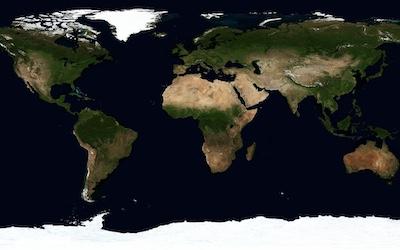Downscaling and Bias-Correction Contribute Considerable Uncertainty to Local Climate Projections in CMIP6
Effectively managing the risks of climate change requires accurate and detailed climate projections and careful consideration of the associated uncertainties. Climate projections are typically based on ensembles of coupled general circulation models (GCMs) run under various greenhouse gas emission scenarios. However, to be useful for local decision-making applications, global GCM outputs are often downscaled (to improve spatial resolution) and bias-corrected (to minimize systematic biases). Modeling choices surrounding climate scenarios, GCMs, and downscaling/bias-correction algorithms all introduce uncertainty that has not been estimated in a systematic way. Through a variance decomposition approach, we quantify the relative uncertainty in global climate projections stemming from four sources: scenario uncertainty, model or GCM uncertainty, downscaling and bias-correction uncertainty, and interannual variability. We examine various climate indicators derived from daily temperature and precipitation using all publicly available statistically downscaled and bias-corrected ensembles from the CMIP6 repository.
Our findings show significant heterogeneity in the uncertainty partitioning across regions, timeframes, and climatic indicators. However, in general, downscaling and bias correction are important sources of uncertainty, often accounting for at least 25% of the total uncertainty globally. Accounting for downscaling and bias-correction uncertainty by sampling from more than one downscaled model ensemble may be advisable, especially for short-term projections, projections of precipitation or extreme temperatures, in regions of complex terrain, or in regions with historical observational disagreement. Relying on a single set of downscaled and bias-corrected data for local-scale analyses might result in overconfidence relative to the full range of possible climate futures.
Efforts to diagnose the risks of a changing climate often rely on downscaled and bias-corrected climate information, making it important to understand the uncertainties and potential biases of this approach. Here, we perform a variance decomposition to partition uncertainty in global climate projections and quantify the relative importance of downscaling and bias correction. We analyze simple climate metrics such as annual temperature and precipitation averages, as well as several indices of climate extremes. We find that downscaling and bias correction often contribute substantial uncertainty to local decision-relevant climate outcomes, though our results are strongly heterogeneous across space, time, and climate metrics. Our results can provide guidance to impact modelers and decision-makers regarding the uncertainties associated with downscaling and bias correction when performing local-scale analyses, as neglecting to account for these uncertainties may risk overconfidence relative to the full range of possible climate futures.

